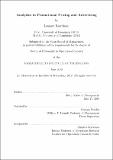Analytics in promotional pricing and advertising
Author(s)
Baardman, Lennart.
Download1120105762-MIT.pdf (3.902Mb)
Other Contributors
Massachusetts Institute of Technology. Operations Research Center.
Advisor
Georgia Perakis.
Terms of use
Metadata
Show full item recordAbstract
Big data and the internet are shifting the paradigm in promotional pricing and advertising. The amount of readily available data from both point-of-sale systems and web cookies has grown, enabling a shift from qualitative design to quantitative tools. In this work, we address how firms can utilize the power of analytics to maximize profits in both their offline and online channels. First, we consider an online setting, in which an advertiser can target ads to the customer in question. The goal of the advertiser is to determine how to target the right audience with their ads. We study this problem as a Multi-Armed Bandit problem with periodic budgets, and develop an Optimistic-Robust Learning algorithm with bounded expected regret. Practically, simulations on synthetic and real-world ad data show that the algorithm reduces regret by at least 10-20% compared to benchmarks. Second, we consider an offline setting, in which a retailer can boost profits through the use of promotion vehicles such as flyers and commercials. The goal of the retailer is to decide how to schedule the right promotion vehicles for their products. We model the problem as a non-linear bipartite matching-type problem, and develop provably-good algorithms: a greedy algorithm and an approximate integer program of polynomial size. From a practical perspective, we test our methods on actual data and show potential profit increases of 2-9%. Third, we explore a supply chain setting, in which a supplier offers vendor funds to a retailer who promotionally prices the product to the customer. Vendor funds are trade deals in which a supplier offers a retailer a short-term discount on a specific product, encouraging the retailer to discount the product. We model the problem as a bilevel optimization model and show that a pass-through constrained vendor fund mitigates forward-buying and coordinates the supply chain on the short term. Finally, we present a pilot study on the impact of promotional pricing on retail profits. We assess the potential impact of our promotion planning tool on historical data from a large retailer. Our results suggest a 9.94% profit improvement for the retailer.
Description
This electronic version was submitted by the student author. The certified thesis is available in the Institute Archives and Special Collections. Thesis: Ph. D., Massachusetts Institute of Technology, Sloan School of Management, Operations Research Center, 2019 Cataloged from student-submitted PDF version of thesis. Includes bibliographical references (pages 191-198).
Date issued
2019Department
Massachusetts Institute of Technology. Operations Research Center; Sloan School of ManagementPublisher
Massachusetts Institute of Technology
Keywords
Operations Research Center.